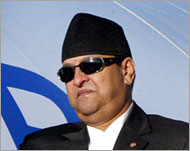Rebels and troops clash in Nepal
Nepalese troops have been fighting an overnight battle against communist rebels in two southwest towns, and the government has imposed a daytime curfew.

Gangadutta Awasti, the chief government administrator in the area, said hundreds of guerrillas attacked security bases late on Friday at Butwal, 280km southwest of Kathmandu, followed by another attack at nearby Taulihawa town around midnight.
Curfew
The country’s royalist government imposed a curfew in Kathmandu and surrounding areas on Saturday and some mobile phone services were disrupted, hours before a rally against King Gyanendra’s rule.
|
“Security forces could shoot violators or police could arrest them and jail them for up to one month” Government statement |
The 11-hour curfew would start at 10am (0415 GMT) and violators could be shot, the government said in a statement.
Residents said some mobile phone and internet services were disrupted before the rally planned by Nepal‘s seven main political parties to pressure the king to step down and restore democracy after 14 months of absolute rule.
The government statement said: “Residents should not come out of their houses. Security forces could shoot violators or police could arrest them and jail them for up to one month.”
Anniversary of democracy
The measure was seen as an attempt by the royalist government to avert a dispute between the parties and the king on the day the troubled Himalayan kingdom marks the 16th anniversary of democracy.
Tensions have been rising in Nepal with activists clashing with police in defiance of a government ban on protests.
 |
|
Some political parties plan to |
The protests and rally are part of a four-day nationwide strike which began on Thursday and has completely shut the country down.
Nepal‘s seven main political parties hope their latest campaign will force the king to step down, 14 months after he sacked the government and seized power, saying politicians had failed to tackle a bloody Maoist revolt.
Multi-party democracy was established on April 8, 1990, after days of violent protests against then King Birendra, Gyanendra’s elder brother, and the killings of dozens of activists.
Sixteen years on, political parties hope that they can recreate that mood and oust Gyanendra, whose move to take power has isolated him globally.